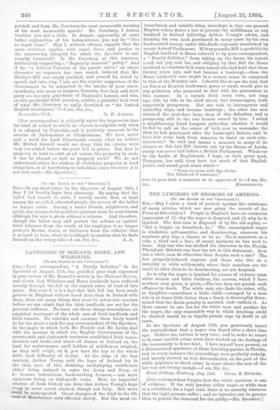THE LYNCHING OF NEGROES IN AMERICA.
[To TIER EDITOR OF TUN " filDROTATOR."] SIR,—May I enter a word of protest against the substance of many articles which are now going the rounds of the Press on this subject P People in England have an erroneous impression of (1) why the negro is despised, and (2) why he is lynched. The first case is disposed of by the old saying :— " Set a beggar on horseback, Sic." The emancipated negro is vindictive, self-assertive, and domineering, wherever his numbers give him a chance to be so. He is moreover, as a rule, a thief and a liar; of moral instincts he has next to none. Any one who has studied his character in the Florida Phosphate districts can bear me out in this statement. How can a white man do otherwise than despise such a one P The few properly-behaved negroes and those who live as a minority in white settlements, where their numbers are too small to allow them to be domineering, are not despised.
As to why the negro is lynched for crimes of violence upon white women and little children, the answer, which I have nowhere seen given, is plain,—The law does not punish such offences by death. The white man who finds his sister, wife, or daughter—sometimes a little child—outraged by a man who is at times little better than a fiend, is thoroughly deter- mined that the death-penalty is merited, and—inflicts it. As there cannot be one law for the white man and another for the negro, the only reasonable way in which lynching could lie checked would be to legally punish rape by death in all cases.
In the Spectator of August 11th, you generously insert the contradiction that a negro was flayed alive a short time ago. Believe me, torture is very rare ; and in order to resort to it, some terrible crime must have worked up the feelings of the community to fever-heat. I have myself been present, as a disinterested spectator, at three lynching-parties in Florida, and in every instance the proceedings were perfectly orderly, and merely showed an iron determination on the part of the white populace to check crime in cases where the arm of the law was not strong enough.—I am, Sir, &c., Grovo Cottage, Newbury, Aug. 21st. CHAS. S. BUTLER.
[Our correspondent forgets that the whole question is one of evidence. If the mob lynches either negro or white man as a substitute for a legal trial, there is no security whatever that the right persons suffer ; and no injustice can be greater than to punish the innocent for the guilty.—En. Spectator.'
































 Previous page
Previous page